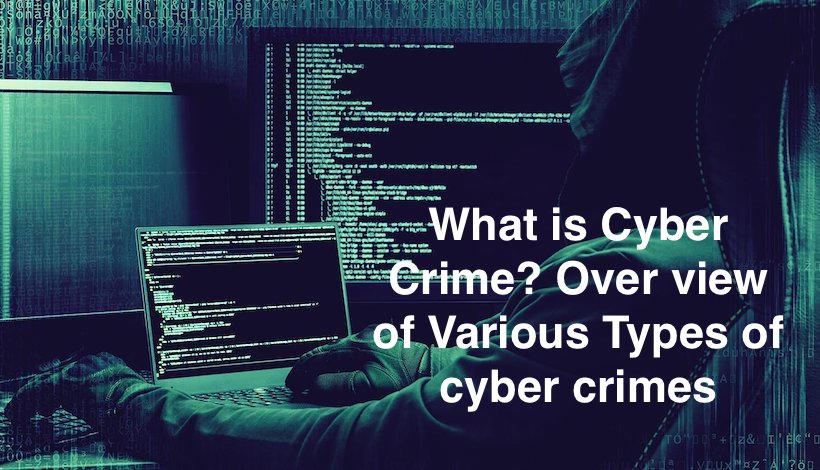What is Cyber Crime?: As the use of internet is increasing, a new face of crime is spreading rapidly from in-person crime to nameless and faceless crimes involving computers. Cybercrime includes all unauthorized access of information and break of security like privacy, password, etc. with the use of internet.
Cyber crimes also includes criminal activities performed by the use of computers like virus attacks, financial crimes, sale of illegal articles, online gambling, e-mail spamming, cyber phishing, cyberstalking, unauthorized access to computer system, theft of information contained in the electronic form, e-mail bombing, physically damaging the computer system, etc.
Quick Links
Over view of Various Types of cyber crimes
Cyber stalking
Online harassment and online abuse all comes under stalking. The term “stalking” generally involves harassing or threatening behaviour that an individual engages in repeatedly, such as following a person, appearing at a person’s home or place of business, making harassing phone calls, leaving written messages or objects, or vandalizing a person’s property. Cyber stalking shares important characteristics with offline stalking; many stalkers (online or off line) are motivated by a desire to control their victims. A major damaging effect of online abuse is a victim avoiding his/her friends, family and social activities.
Intellectual Property Crimes
Intellectual property consists of a person’s creations such as articles, books, paintings, photos or any such intellectual content. Any unlawful act by which an owner of such intellectual property is deprived completely or partially of his rights is an offence and this is known as intellectual property crime. The common form of IPR violation/crime may be said to be software piracy, infringement of copyright, trademark, patents, designs and service mark violation, theft of computer source code, etc
Bot Networks
The word botnet is made from two words – robot and network. A cyber crime is called ‘Bot Networks’, when hackers remotely take control upon computers by using malware software. Computers can be co-opted into a botnet when they execute malicious software. A botnet’s originator can control a group of computers too remotely.
Hacking
In general, the word ‘hacking’ means seeking and exploiting the weakness and security of a computer system or a computer network for unauthorized access. The person who does hacking is known as hacker. A Hacker uses his/her computer expertise and some tool or scripts to hack any computer system.
Internet Time Thefts
Basically, Internet time theft comes under hacking. It is the use by an unauthorized person, of the Internet hours paid for by another person. The person who gets access to someone else’s Internet Service Provider given user ID and password, either by hacking or by gaining access to it by illegal means, uses it to access the Internet without the person’s knowledge.
Cracking
It is a dreadful feeling to know that a stranger has broken into user computer systems without user’s knowledge and consent and has tampered with precious confidential data and information. A Cracker differs from the hacker because hacker is hired by companies to audit network security or test software but cracker do the same work for their own profit or to harm others.
Phishing
Phishing means acquiring information such as usernames, passwords, credit card details, personal detail etc by electronic communication. Phishing commonly uses fake emails or fake messages which contain link of virus/ malware infected fake websites. These websites request user to enter their personal details. Then get hold of these and commit a fraud.
Voice Phishing
The term is a combination of “voice” and “phishing”. Voice phishing is used to gain access of private, personal and financial information from the public. Voice phishing uses a landline telephone call to get information.
Carding
It means false ATM cards i.e. Debit and Credit cards used by criminals for their monetary benefits through withdrawing money from the victim’s bank account.
E-Mail/SMS Spoofing
A spoofed E-mail/ SMS may be said to be one, which misrepresents its origin. It shows it’s origin to be different from which actually it originates. Here an offender steals identity of another in the form of email address, mobile phone number etc., and sends the message via internet.
Cross-site Scripting
Cross-site scripting (XSS) is a type of computer security vulnerability. By cross-site scripting attacker can bypass the predefined access permissions of website. Reflected XSS is the most frequent type of XSS attack. Reflected XSS attack is also known as non-persistent XSS. Scripting languages like java script, VBScript etc are used for Reflected XSS attack.
Cyber Squatting
Squatting is the act of occupying an abandoned or unoccupied space. Cyber squatting is the act of registering a famous domain name and then selling it to needy for a high cost. It means where two persons claim for the same Domain Name either by claiming that they had registered the name first or by right of using it before the other or using something similar to that previously.
Cyber Vandalism
Vandalism means destroying or damaging property of another. Thus cyber vandalism means destroying or damaging the data when a network service is stopped or disrupted. It may include within its purview any kind of physical harm done to the computer of any person.
Cyber Trespass
It means to access someone’s computer without the proper authorization of the owner without disturbing, altering, misusing, or damaging data or system by using wireless internet connection.
Cyber Trafficking
It may be trafficking in drugs, human beings, arms weapons etc. which affects large number of persons through internet. Trafficking in the cyberspace is also a gravest crime.
Cyber crime & Social Networking:
Cyber criminals use social media for not only to commit crime online, but also for carrying out real world crime owing to “over-sharing” across these social platforms. This risk is associated with our identities. Identity theft can happen to anyone who exposes too much personal information online on various social networking sites. To protect one self, get to know the security and privacy settings, and configure them to protect from identity theft. One in five online adults (21 percent) have reported of becoming a victim of either social or mobile cyber crime and 39 percent of social network users have been victims of profile hacking, scam or fake link.
Recommended
- SIM Swap Fraud
- Andhra Bank NEFT
- Canara Bank NEFT
- Bank of India NEFT
- Axis Bank NEFT
- Bank of Baroda NEFT







